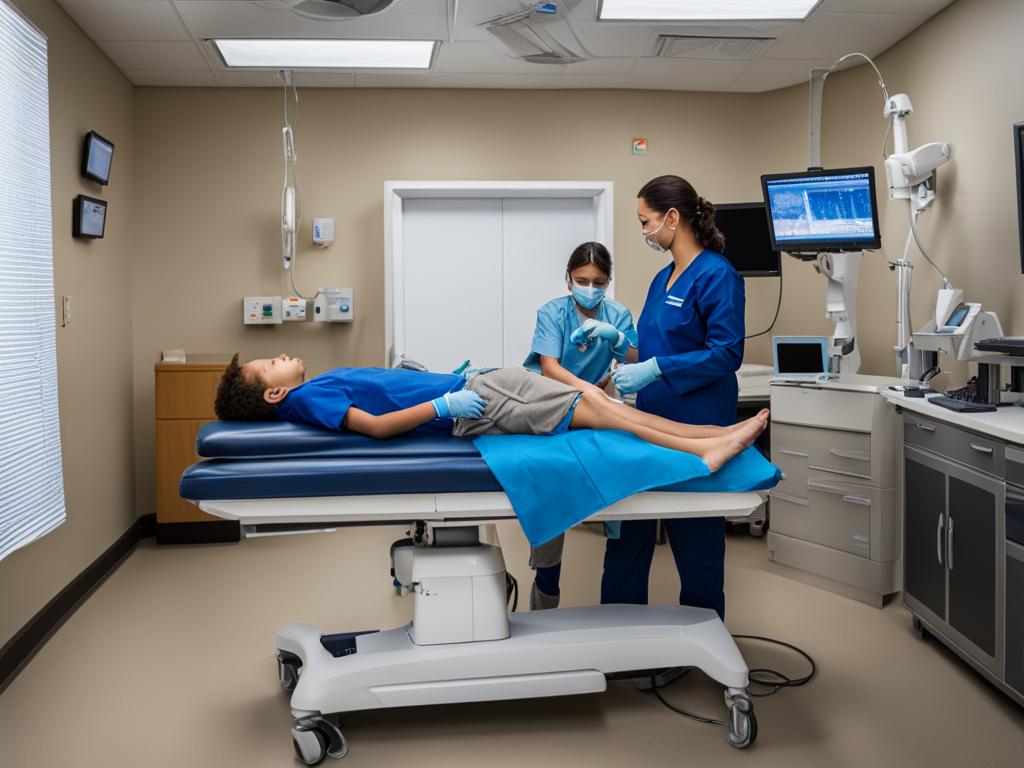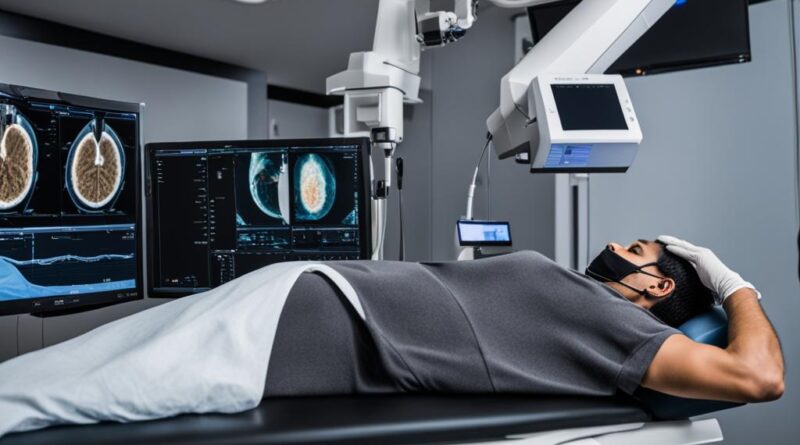Step-by-Step Guide: How to Become a Neuro Sonographer
Becoming a neuro sonographer is a rewarding career in healthcare that involves using high-frequency sound waves to obtain images of the brain, spinal cord, and other structures. The role of a neuro sonographer is crucial in detecting abnormalities and conditions in the brain and nervous system, particularly in preterm babies who are at risk for intraventricular bleeding and brain injuries.
Key Takeaways:
- Neurosonography is a specialized field that involves using sonography to diagnose and monitor neurological conditions.
- Individuals can pursue a career in neurosonography by completing a one-year certificate program or an undergraduate program followed by certification.
- Certification is not mandatory but preferred by most employers, and it can be obtained through organizations like the American Registry for Diagnostic Medical Sonography (ARDMS) or the American Society of Neuroimaging (ASN).
- Neuro sonographers can specialize in areas such as neonatal neurosonography, pediatric neurosonography, or adult neurosonography.
- The demand for neuro sonographers is expected to grow due to advancements in imaging technology and the need for diagnostic services.
The Role of Brain Sonography in Neurological Diagnosis
Brain sonography, also known as neurosonography or neurosonology, is a non-invasive imaging test that plays a crucial role in diagnosing and monitoring neurological conditions in patients of all ages. It utilizes high-frequency sound waves to obtain detailed images of the brain, allowing healthcare professionals to identify abnormalities and disorders. This procedure is particularly valuable in newborns, as it can detect congenital and infectious diseases, abnormal growths, and cerebellar anomalies.
Neurosonography is also utilized in adult patients to diagnose neurological and neurodegenerative diseases, such as Parkinson’s. By capturing real-time images of the brain, it enables physicians to detect vascular abnormalities, brain infections, head trauma, and central nervous system disorders. Certified sonographers or physicians who meet the training guidelines set by the American Institute of Ultrasound in Medicine (AIUM) perform brain sonography procedures.
“Brain sonography is a safe and effective imaging technique for diagnosing neurological conditions. It provides valuable information without exposing patients to ionizing radiation. By visualizing the brain in real-time, it allows healthcare professionals to accurately identify and monitor diseases.”
To perform brain sonography, an ultrasound probe is gently placed on the patient’s scalp, transmitting sound waves that bounce back and create images. This procedure is painless, non-invasive, and does not require any preparation. It is often performed in conjunction with other diagnostic tests to provide a comprehensive evaluation of the brain and nervous system.
| Advantages of Brain Sonography | Limitations of Brain Sonography |
|---|---|
| Non-invasive procedure | Inability to visualize deep brain structures |
| No exposure to ionizing radiation | Operator dependence on obtaining accurate images |
| Real-time imaging provides immediate results | Limitations in older patients due to fontanelle closure |
| Cost-effective compared to other imaging modalities | Not suitable for all neurological conditions |
Training in Medical Sonography
If you’re interested in pursuing a career in neurosonography, you’ll need to undergo specialized training in medical sonography. This training prepares individuals to operate ultrasound equipment and perform diagnostic imaging procedures.
There are different educational pathways to become a neurosonographer. If you already have a medical background, you can opt for a one-year certificate program in medical sonography. These programs provide focused training in neurosonography techniques and protocols.
Alternatively, if you don’t have a healthcare background, you can choose an associate or bachelor’s degree program in diagnostic medical sonography. These programs typically include comprehensive coursework and clinical rotations to develop the necessary skills and knowledge for a career in sonography.
Reputable Institutions Offering Medical Sonography Programs:
| Institution | Location |
|---|---|
| South College | Knoxville, Tennessee |
| East Coast Polytechnic Institute | Virginia Beach, Virginia |
| Pima Medical Institute | Multiple Locations |
| Jackson College | Jackson, Michigan |
Completing a medical sonography program is the first step toward becoming a neurosonographer. These programs provide a solid foundation of knowledge in ultrasound physics, anatomy, and pathology, as well as hands-on training with state-of-the-art equipment. Graduates of these programs are then eligible to take the certification exam administered by the American Registry for Diagnostic Medical Sonography (ARDMS) to become registered and pursue career opportunities as neurosonographers.
Certification in Neurosonography
Obtaining certification in neurosonography can enhance your credentials and increase your chances of employment in this specialized field. While certification is not mandatory, many employers prefer hiring neurosonographers who hold the Registered Diagnostic Medical Sonographer (RDMS) credential in neurosonography.
The American Registry for Diagnostic Medical Sonography (ARDMS) offers the RDMS certification, which demonstrates your proficiency in performing neurosonography procedures and interpreting the obtained images. To be eligible for certification, you must meet the ARDMS education and clinical experience requirements and pass the neurosonography examination.
Having an RDMS certification in neurosonography provides validation of your skills and knowledge in this specific area of sonography. It showcases your dedication to excellence and commitment to maintaining professional standards. Additionally, the certification can open doors to career advancement opportunities and potentially higher salaries.
If you are interested in pursuing a career in neurosonography, obtaining the ARDMS certification is a valuable step towards becoming a qualified and competitive candidate in the field.

Benefits of ARDMS Certification in Neurosonography
Certification from the ARDMS in neurosonography offers several benefits, including:
- Enhanced job prospects: Many employers prefer hiring certified neurosonographers, as it provides assurance of their competence and expertise.
- Professional recognition: The RDMS credential in neurosonography is widely recognized and respected within the healthcare industry, further validating your skills.
- Continuing education opportunities: Maintaining your certification requires completing continuing medical education (CME) credits, which allows you to stay updated with the latest advancements and developments in neurosonography.
- Networking opportunities: Joining professional organizations associated with neurosonography certification, such as the American Society of Neuroimaging (ASN) or the Society of Diagnostic Medical Sonography (SDMS), can connect you with other professionals in the field and provide access to valuable resources.
Obtaining certification in neurosonography can open doors to rewarding career opportunities and provide a solid foundation for professional growth in this specialized field.
Salary and Job Outlook for Neuro Sonographers
Neuro sonography is a rapidly growing field within healthcare, and as a result, the demand for skilled neuro sonographers is on the rise. This increased demand is primarily driven by advancements in imaging technology and the growing need for diagnostic services. The job outlook for neuro sonographers is quite promising, with employment opportunities expected to increase by 12% between 2019 and 2029.
In terms of salary, neuro sonographers can expect to earn a competitive income. On average, neuro sonographers earn around $74,320 per year. However, experienced professionals can make well over $102,000 annually. The exact salary can vary depending on factors such as location, level of experience, and the specific healthcare setting.
To illustrate the job outlook and salary data for neuro sonographers, the following table provides a comprehensive overview:
This table highlights the projected growth rate for neuro sonographers, the average salary, as well as the potential for higher earnings with experience. It is important to note that these figures are based on national averages and may vary depending on regional factors.
Specializations in Neurosonography
Within the field of neurosonography, professionals can choose to specialize in specific areas. These specializations allow sonographers to focus their expertise and provide specialized care to patients. Some of the common specializations in neurosonography include:
1. Neonatal Neurosonography: Neonatal neurosonography focuses on studying and diagnosing neurological disorders in infants, particularly premature or low birth weight infants. This specialization requires a deep understanding of the unique challenges and considerations involved in imaging the developing brains of newborns.
2. Pediatric Neurosonography: Pediatric neurosonography deals with neurological conditions in children. This specialization covers a wide range of issues, including brain tumors, developmental delays, and epilepsy. Sonographers specializing in pediatric neurosonography must have the skills to work with young patients and adapt imaging techniques to their specific needs.
“Specializing in neonatal neurosonography allows me to make a difference in the lives of premature babies. By accurately diagnosing and monitoring their brain development, we can provide timely interventions and improve their long-term outcomes.” – Neurosonographer
These specializations require additional training and expertise beyond the general knowledge and skills of a neurosonographer. Sonographers interested in pursuing a specialization should seek additional education and training programs that focus on the specific area of interest. By specializing, sonographers can enhance their career prospects and provide specialized care to patients in need.
| Neurosonography Specialization | Required Training | Additional Certification |
|---|---|---|
| Neonatal Neurosonography | Specialized courses on neonatal neurosonography techniques and pathologies | None |
| Pediatric Neurosonography | Additional coursework on pediatric neurology and imaging techniques for children | Certification in Pediatric Sonography (PS) offered by ARDMS |

Specializing in neurosonography allows sonographers to focus their skills and knowledge on specific patient populations and conditions. Whether it’s working with premature infants or diagnosing neurological disorders in children, specialized neurosonographers play a crucial role in providing accurate diagnoses and care. By expanding their expertise through additional training and certification, sonographers can open up new career opportunities and make a meaningful impact on the lives of their patients.
Education and Certification Requirements for Other Sonography Specializations
Aside from neurosonography, individuals interested in pursuing a career in sonography can choose from various specialized areas. These specializations include abdominal sonography, breast sonography, obstetric and gynecological sonography, echocardiography, and vascular sonography. Each specialization requires specific education and certification to ensure proficiency in the field.
Abdominal Sonography
Abdominal sonography focuses on imaging the abdominal organs, such as the liver, gallbladder, pancreas, kidneys, and spleen. To become an abdominal sonographer, individuals can enroll in a two-year degree program or a certificate program in sonography with a specialization in abdominal imaging. These programs teach students how to use ultrasound equipment to obtain high-quality images of the abdominal organs and diagnose conditions such as tumors, cysts, and gallstones.
Breast Sonography
Breast sonography is a specialized field that involves imaging and diagnosing conditions related to breast health. Sonographers specializing in breast imaging play a crucial role in detecting breast cancer and assisting in the evaluation of breast abnormalities. To obtain certification in breast sonography, individuals must complete a program that focuses on breast imaging and receive clinical training in breast sonography techniques. Certification can be obtained through organizations such as the American Registry for Diagnostic Medical Sonography (ARDMS).
Obstetric and Gynecological Sonography
Obstetric and gynecological sonography involves the imaging of the female reproductive system during pregnancy and various gynecological conditions. Sonographers in this field assist in monitoring the health and development of fetuses, as well as diagnosing conditions such as ovarian cysts, uterine fibroids, and endometriosis. To specialize in obstetric and gynecological sonography, individuals can pursue an associate or bachelor’s degree program with a focus on obstetric and gynecological imaging. Certification in this field can be obtained through organizations like the ARDMS.
Whether it’s abdominal, breast, or obstetric and gynecological sonography, each specialization requires specific education and certification to ensure proficiency in the field. These specialized areas offer unique opportunities to work in specialized medical facilities, including hospitals, clinics, and imaging centers, where sonographers play a vital role in diagnosing and treating various conditions. The demand for skilled and certified sonographers continues to grow, making these specializations promising career paths for individuals interested in the field of medical sonography.
Sonographer Job Opportunities and Career Options
For individuals interested in pursuing a career in sonography, there are a variety of job opportunities and career options available. Sonographers play a crucial role in the healthcare field, performing diagnostic imaging procedures to assist in the diagnosis and treatment of medical conditions. The demand for skilled sonographers is on the rise, making it an attractive career path for those seeking stability and growth.
Sonographer Job Opportunities: Sonographers can find employment in various settings, including general medical and surgical hospitals, physicians’ offices, imaging centers, and specialized clinics. These roles involve working closely with patients, operating ultrasound equipment, and capturing images to aid in the diagnostic process. The job market for sonographers is expanding rapidly, with a projected growth rate of 17% between 2019 and 2029.
Sonography Career Options: Within the field of sonography, there are opportunities to specialize in specific areas. Some popular specializations include abdominal sonography, breast sonography, obstetric and gynecological sonography, echocardiography, and vascular sonography. Each specialization requires additional training and expertise, allowing sonographers to focus on specific areas of interest and gain specialized knowledge.
“The field of sonography offers diverse career opportunities and the chance to make a positive impact on patients’ lives.”
Career Advancement and Growth
As sonographers gain experience and expertise in their field, there are opportunities for career advancement and growth. Sonographers may choose to specialize in a specific area, pursue leadership positions, or transition into roles such as education, research, or management. Continuous learning and professional development are essential for staying current with advancements in technology and maintaining skills in this rapidly evolving field.
Job Search in Sonography
When searching for sonography job opportunities, several resources can be helpful. Online job platforms like Indeed.com, UltrasoundJOBS by ARDMS, and Pronto.com offer dedicated listings for sonographer positions. Networking within the healthcare community, attending job fairs, and reaching out to local hospitals and imaging centers can also provide valuable leads for job openings. Additionally, joining professional organizations and staying actively engaged in the field can enhance career prospects and open doors to new opportunities.

Conclusion
Becoming a neuro sonographer is a rewarding career choice that requires specialized training and certification. Neurosonography plays a crucial role in diagnosing and monitoring neurological conditions in patients of all ages, particularly in newborns and infants.
With the increasing demand for skilled sonographers, pursuing a career in neurosonography can lead to job opportunities, competitive salaries, and the satisfaction of making a difference in patients’ lives.
FAQ
What is neuro sonography?
Neuro sonography is a medical imaging technique that uses high-frequency sound waves to obtain images of the brain, spinal cord, and other structures. It is used to detect abnormalities and conditions in the brain and nervous system.
What does a neuro sonographer do?
A neuro sonographer performs brain sonography to identify congenital and infectious diseases, abnormal growths, and other disorders in newborns. They also assist in diagnosing neurological and neurodegenerative diseases, such as Parkinson’s, in adult patients.
How do I become a neurosonographer?
To become a neurosonographer, you can complete a one-year certificate program or an associate/bachelor’s degree program in medical sonography. After completing the program, you can take the certification exam administered by the American Registry for Diagnostic Medical Sonography (ARDMS).
Is certification in neurosonography required?
Certification in neurosonography is optional, but most employers prefer hiring neurosonographers who are certified by the ARDMS. The ARDMS also offers pediatric sonography (PS) examination, which covers topics related to neurosonology.
What is the average salary of a neuro sonographer?
Neuro sonographers can expect to earn an average salary of around $74,320 per year, with experienced professionals making over $102,000.
What are the career opportunities for sonographers?
Sonographers can work in general medical and surgical hospitals, physicians’ offices, and imaging centers. The demand for sonographers is expected to increase due to advancements in imaging technology and the growing need for diagnostic services.
Can I specialize in a specific area of neurosonography?
Yes, within the field of neurosonography, you can specialize in areas such as neonatal neurosonography, pediatric neurosonography, and adult neurosonography. These specializations require additional training and expertise.
What are the education and certification requirements for other sonography specializations?
Other specialized areas of sonography, such as abdominal sonography, breast sonography, obstetric and gynecological sonography, echocardiography, and vascular sonography, typically require completing a 2-year degree program or a certificate program in sonography. Certification can be obtained through organizations like the ARDMS.
Where can I find job opportunities for sonographers?
You can find sonography-specific positions on websites like Indeed.com, UltrasoundJOBS by ARDMS, and Pronto.com.

